

Lizard Squad Hackers Hit Xbox Live. Despite promises to leave Microsoft's Xbox Live platform and Sony's PlayStation Network alone, hacker group "The Lizard Squad" is back.

Late on Sunday, the hacker group tweeted a warning that Xbox Live would be next on their list of targets. Not one hour later, the hackers posted a series of tweets: "Xbox (360) Live #offline", "One more thing: Tell KimDotcom to take his vouchers and shove them up his fat a**", "XBL attack was done with the help of our associates from LNO: @LNOuNiTy @LNOVenom @Guidelines @we_are_lno", and "Haha "Xbox" is trending Worldwide. A Starting Point for Ensuring Student Online Privacy. Our society is struggling with issues regarding individual privacy.
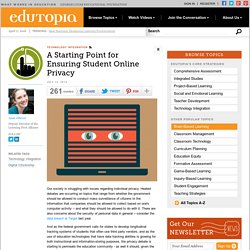
Heated debates are occurring on topics that range from whether the government should be allowed to conduct mass surveillance of citizens to the information that companies should be allowed to collect based on one's computer activity -- and what they should be allowed to do with it. There are also concerns about the security of personal data in general -- consider the data breach at Target last year. Military Spouses Hacked, Threatened by Alleged ISIS Sympathizer. A hacker purporting to be an ISIS sympathizer breached the social accounts of a U.S.

Marine's wife Tuesday, threatening her then using her Twitter feed to threaten at least four other military spouses and the Obama family, two of the spouses confirmed to NBC News. The FBI is investigating the breach and the online threats, said Liz Snell, a Marine wife, whose Twitter and Facebook accounts were hacked. Snell's husband was deployed to Iraq or Afghanistan five times.
The FBI pulled down Snell's Twitter account on Tuesday morning, she said, and Snell removed her compromised Facebook profile. NBC News contacted the FBI, seeking confirmation that the agency is investigating the matter. 10 Ways to Avoid Fraud. Scam artists in the U.S. and around the world defraud millions of people each year.
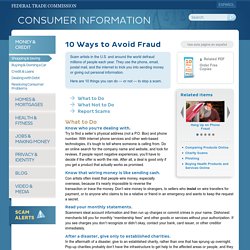
They use the phone, email, postal mail, and the internet to trick you into sending money or giving out personal information. Here are 10 things you can do — or not — to stop a scam. How to Keep Your Personal Information Secure. Protecting your personal information can help reduce your risk of identity theft.
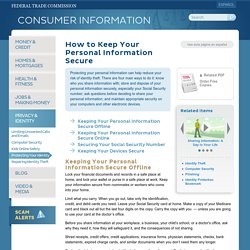
There are four main ways to do it: know who you share information with; store and dispose of your personal information securely, especially your Social Security number; ask questions before deciding to share your personal information; and maintain appropriate security on your computers and other electronic devices. Keeping Your Personal Information Secure Offline Lock your financial documents and records in a safe place at home, and lock your wallet or purse in a safe place at work.
Disposing of Old Computers. Getting rid of your old computer?
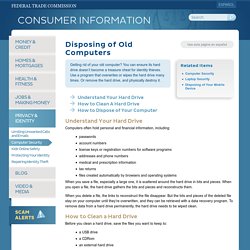
You can ensure its hard drive doesn’t become a treasure chest for identity thieves. Use a program that overwrites or wipes the hard drive many times. Or remove the hard drive, and physically destroy it. Computer Security. Scammers, hackers, and identity thieves are looking to steal your personal information – and your money.
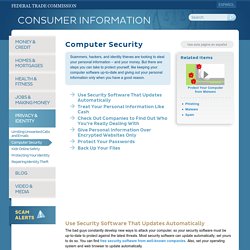
But there are steps you can take to protect yourself, like keeping your computer software up-to-date and giving out your personal information only when you have a good reason. Use Security Software That Updates Automatically The bad guys constantly develop new ways to attack your computer, so your security software must be up-to-date to protect against the latest threats. Most security software can update automatically; set yours to do so. How to Take Good Care of Your Laptop Computer. <img alt="Image titled Seagate_ST33232A_hard_disk_inner_view" src=" width="728" height="362" class="whcdn" onload="WH.performance.clearMarks('image1_rendered'); WH.performance.mark('image1_rendered');"> <img alt="Image titled Take Good Care of Your Laptop Computer Step 1" src=" width="728" height="485" class="whcdn">1Keep liquids away from your laptop.

As tempting as it might be to drink coffee, soda, water or any other liquid near your laptop, accidents can happen all too easily. Alternatively, use a cup with a cover on it, so even if it does spill, the liquid doesn't go anywhere. Military Spouses Threatened by ISIS Affiliate on Twitter, Facebook. A group claiming to be affiliated with the ISIS militant group hacked the Military Spouses of Strength Twitter account Tuesday morning and sent threats to a group of military spouses on Twitter and Facebook.
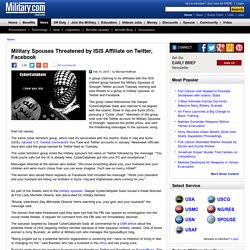
The group called themselves the Gasper CyberCaliphate Sadz and claimed to be aligned with the Islamic State in Iraq and Syria (ISIS) pursuing a "Cyber Jihad. " Members of the group took over the Twitter account for Military Spouses of Strength, replaced the profile photo, and sent the threatening messages to the spouses using their full names. The same cyber terrorism group, which said it's associated with the Islamic State in Iraq and Syria (ISIS), hacked U.S. Central Command's You Tube and Twitter accounts in January. Newsweek officials have also said the group hacked its Twitter feed on Tuesday. ISIS Threatens Military Families Via Social Media.
Anonymous: We've taken down 800 ISIS Twitter accounts - Feb. 10, 2015. Hacking group Anonymous claimed responsibility for targeting nearly 800 Twitter accounts, 12 Facebook pages and over 50 email addresses because of their links with ISIS.

Twitter (TWTR, Tech30) did not respond to a request for comment. Facebook (FB, Tech30) said it had shut down 11 of the 12 pages listed by Anonymous because they breached its rules. It declined to comment on whether it had been alerted to the offending content by the hackers. Hackers are stealing your tax refund - Feb. 10, 2015. Last year alone, hackers stole more than 6.5 million Social Security numbers. The number of SSNs stolen this year might be significantly higher, given the recent Anthem hack of 80 million customers. (The company hasn't yet said how many SSNs were lost.) Report: Using Malware, Hackers Steal Millions From Banks.
Putting in place a sophisticated digital racket, hackers were able to steal millions of dollars from up to 100 banks in what the Russian cybersecurity company Kaspersky Lab is calling "the most successful criminal cyber campaign we have ever seen. " Kaspersky, which helped uncover a piece of malicious software in the systems of bank computers, says the scheme worked like this: First the hackers were able to install malicious software on computers by phishing bank employees.
That led to the infection of hundreds of machines. The hackers kept watch until they found the computer of an administrator. Cookies: Leaving a Trail on the Web. Have you ever wondered why some online ads you see are targeted to your tastes and interests, or how websites remember your preferences from visit to visit? The answer may be in the “cookies.” A cookie is information saved by your web browser, the software program you use to visit the web. Cookies can be used by companies that collect, store and share bits of information about your online activities to track your behavior across sites. Cookies also can be used to customize your browsing experience, or to deliver ads targeted to you. Bank Hackers Steal Millions via Malware. Photo PALO ALTO, Calif. — In late 2013, an A.T.M. in Kiev started dispensing cash at seemingly random times of day. No one had put in a card or touched a button. Cameras showed that the piles of money had been swept up by customers who appeared lucky to be there at the right moment.
Ghostery. Cell Phone Security - How to Secure your Phone and Stop Spy Software Apps - SpyzRus.net. There are a few simple steps you can take to increase your cell phone security and stop anyone installing spy software on your mobile phone. This is part of my series of articles aimed at keeping your phone safe from cell phone spy and monitoring software, you might want to check out: How to Check for Spy Software and How to Remove Spy Software from Your Cell Phone. The focus of this article is Prevention. Phone surveillance. 9 Calif. law enforcement agencies connected to cellphone spying technology.
Remotely Monitor Cell Phones and Computers with Mobistealth. Smartphone Monitoring. FTC sees privacy threats in the 'Internet of Things' - Katy Bachman - POLITICO. Privacy, security threats in the 'Internet of Things' The Five Biggest Threats to Your Kids’ Privacy, and What You Can Do About Them. Net Threats. Malware. Malware Free Download and software reviews. Mobile Malware: Small Numbers, but Growing. Which nation-state is behind the sophisticated, stealthy Regin malware? Identity Theft. FDIC: Identity Theft & Fraud. 10 Ways To Protect Yourself From Identity Theft. Protect Yourself from Malware.
How Do I Protect Myself Against Malware? Local & North Carolina state news from Raleigh, NC. GameOver Zeus: Removal, detection and how you can protect yourself - News - Gadgets and Tech - The Independent. How can I protect my Windows PC against malware? How to Protect Your Computer from Hackers, Spyware and Viruses. TOP Spy Cell Phone Software Reviews. How to Tell if your Cell Phone is Being Tracked, Tapped or Monitored by Spy Software - SpyzRus.net.